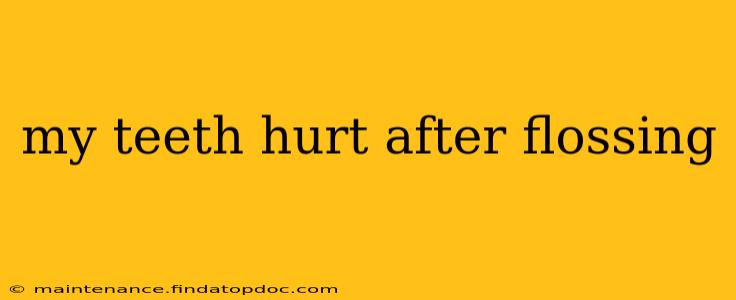Flossing is crucial for maintaining good oral hygiene, but sometimes, that fresh-feeling clean comes with a price: pain. If your teeth hurt after flossing, don't panic. It's a common issue with several possible causes, most of which are easily addressed. Let's explore why your teeth might be hurting after flossing and what you can do about it.
Why Do My Teeth Hurt After Flossing?
The pain you experience after flossing can stem from various factors, ranging from simple technique issues to more serious underlying problems. Let's delve into some of the most common culprits:
1. Aggressive Flossing Technique:
This is the most frequent cause. Using excessive force while flossing can irritate your gums, leading to bleeding and soreness. Gums are delicate tissues, and forceful flossing can damage them, causing inflammation and pain. Remember, flossing should be a gentle, careful process, not a power struggle.
2. Gum Disease (Gingivitis or Periodontitis):
If your gums are already inflamed or infected due to gum disease, flossing can exacerbate the pain. Gingivitis, the early stage of gum disease, is characterized by redness, swelling, and bleeding gums. Periodontitis, a more advanced stage, can lead to bone loss and tooth loss. If you experience persistent bleeding or pain, it's crucial to see a dentist.
3. Newly Exposed Tooth Roots:
Gum recession, a condition where your gums pull back, exposing the roots of your teeth, can make them sensitive to temperature changes and even the friction of flossing. These exposed roots lack the protective enamel covering the crowns of your teeth, making them vulnerable.
4. Recent Dental Work:
Following a procedure like teeth cleaning, filling, or extraction, temporary sensitivity is common. The tissues may be irritated or slightly damaged, leading to discomfort when flossing. This usually subsides within a few days.
5. Improper Flossing Technique:
Incorrect flossing technique can cause injury. Snapping the floss against your gums or not using enough floss to reach between teeth can irritate the gum tissues and cause pain.
6. Dry Mouth:
Saliva plays a crucial role in protecting your mouth and gums. Dry mouth, often caused by medication or medical conditions, can increase sensitivity and make flossing more painful.
What Should I Do If My Teeth Hurt After Flossing?
1. Adjust Your Technique: Use a gentle, back-and-forth motion, curving the floss around each tooth in a "C" shape. Avoid snapping the floss against your gums.
2. Use a Different Type of Floss: Experiment with different floss types like waxed floss, Teflon-coated floss, or floss picks. These can be more gentle on sensitive gums.
3. Rinse with Mouthwash: A therapeutic mouthwash can help soothe irritated gums and reduce inflammation.
4. See a Dentist: If the pain is severe, persistent, or accompanied by other symptoms like swelling, fever, or pus, it's vital to consult your dentist. They can diagnose the underlying cause and recommend appropriate treatment.
How Can I Prevent Tooth Pain After Flossing?
- Gentle Flossing: Remember, gentle is key! Avoid excessive force.
- Regular Flossing: Daily flossing is essential, but gradual increase in frequency will allow your gums to adapt if you're new to flossing.
- Proper Technique: Use the correct flossing technique to minimize gum irritation.
- Good Oral Hygiene: Maintain excellent oral hygiene overall, including brushing twice a day with fluoride toothpaste.
- Regular Dental Checkups: Visit your dentist for regular checkups and cleanings. Early detection of gum disease can prevent more serious problems.
By following these tips and being mindful of your flossing technique, you can significantly reduce the chances of experiencing pain after flossing and maintain healthy gums and teeth. Remember, a little discomfort is sometimes normal, but persistent pain warrants professional attention.
